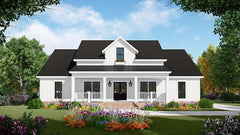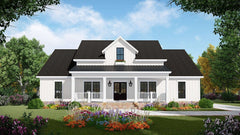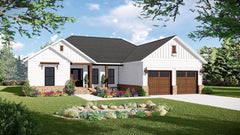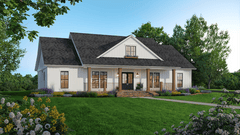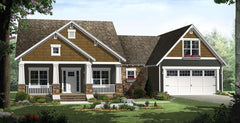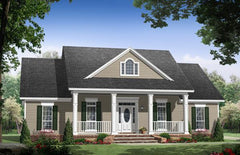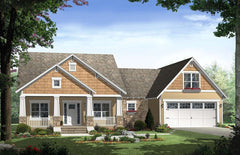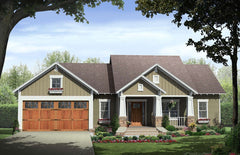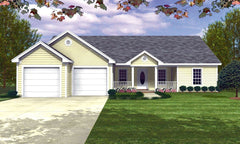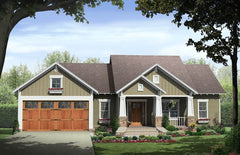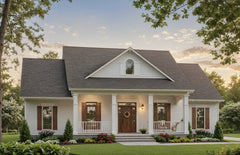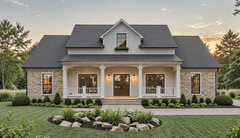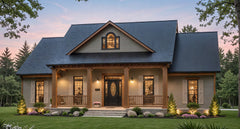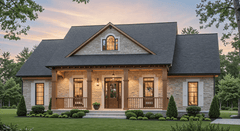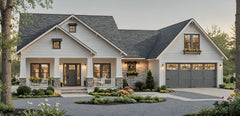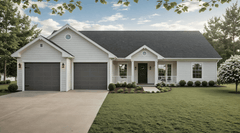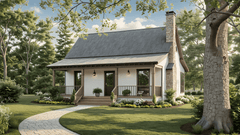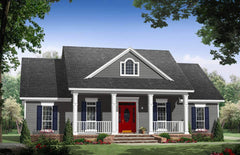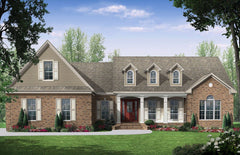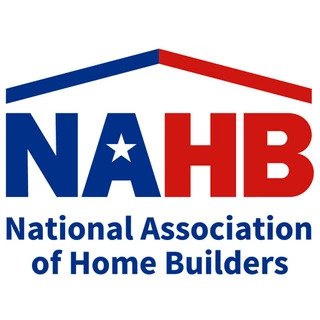

Transcript of Build Your Dream Home Podcast - Episode 3:
Mark Mathis:
This is the Build Your Dream Home Podcast with Mark Mathis, Episode 3.
Announcer:
Always wanted to build your dream house but not sure where to start? You're in the right place. Welcome to the Build Your Dream Home Podcast where experts in the industry share their knowledge and help you to be one step closer to building your dream home. Here's your host, Mark Mathis.
Mark Mathis:
Hey, everybody. This is Mark Mathis from the Build Your Dream Home Podcast presented by houseplangallery.com. I appreciate you taking the time out of your busy schedule to be with us today and listen to this episode.
I cannot believe that it's already this close to Thanksgiving. It's incredible how quickly this year has been winding down. This part of the year really, really moves fast. My wife was actually here this morning. We were talking about Christmas cards and how we have to still take our family pictures and get those out. I think there's just about no time left to do that kind of thing.
Anyway, it's incredible how quickly this time of year goes by. Before you know it, we'll be in 2014. There's never been a better time to build your house. Again, if you're looking to build a house starting in the spring, you definitely want to start looking at house plans and talking to builders and things like that.
In this episode, we're going to have a lot of fun. We've got an interview with our friend Kenny Hodges from Assurance Financial. As always, if you want to get all the episodes, you can just go to our website at houseplangallery.com/podcast, P-O-D-C-A-S-T, no S on the end. You can see all the interviews there and the previous episodes and subscribe in iTunes.
Again, if you've enjoyed the show, we'd love for you to go out to iTunes and actually leave us a review. That lets us know that the information that we're putting out there is something that you're looking for and you're interested in. We value your comments, your feedback, and your ratings. All of those things help us to reach more people that are looking to achieve that dream of building their dream home.
I want to go over one quick testimonial that we just got in today actually. This one is from Lottie in Eupora, Mississippi. We sell quite a few plans here in Mississippi, Louisiana, Alabama, Georgia, South Carolina, and North Carolina. All those states in the southeastern United States, primarily, are big markets for us.
Lottie bought our plan HPG-1502-1: The Oak Hollow. That's a 1,502-square-foot house plan. It's three bedroom, two bath. Beautiful, beautiful house. We've gotten a lot of really positive feedback on that particular plan.
Lottie says, "We constantly receive compliments about how beautiful the home is. I went online and found your house plans and loved them. We were looking to build something a little smaller than the house we previously had, and we were moving from the Gulf coast up to north Mississippi, so when I found this plan, it was perfect for us. We constantly receive compliments on how beautiful the home is and how the floor plan is so well laid out and utilizes every square inch of space. I really enjoyed building the home and would recommend House Plan Gallery, wholeheartedly, to anyone looking for a beautiful, well-designed, and affordable home design."
Well, thank you so much, Lottie. That's one of the things that we pride ourselves on is that ability to maximize every square inch of space that you have in the floor plans that we design. Many of the homes that you'll find from other designers typically have a lot of wasted space and a lot of unused space. We try to maximize that usability and build our plans around the way people actually live. With the most popular plans, right now, being between 1,400 to 1,900 or 2,000 square feet, you don't have a tremendous amount of space to play with, so you really have to be smart in how you design the different areas of your home so that your family is comfortable and you have all the different features and functionalities that you like in your layout.
I found a couple of really interesting articles. Everyone knows Mark Zuckerberg from Facebook. I just saw an article on the Business Insider where he has actually just spent more than $30 million buying four neighborhood houses for privacy. That must be nice. He goes on to say he bought four different units, including one that's 2,600 square foot that cost 14 million, says his own home is twice as large at 5,000 square feet and cost half as much.
It says Larry Page of Google made a similar move a few years ago so he could build a 6,000-square-foot mansion, but Zuckerberg's reason is different. He just doesn't want to live in excess. He just wants a little privacy. That must be nice. Zuckerberg repeatedly took action after he learned that a developer wanted to purchase one of his neighbor's homes and use the fact that Zuckerberg lived close by as a marketing tactic. He started purchasing homes around December, and he'll lease those four homes back to the current residents.
People will go a long way to get privacy, and so especially if you have a rural piece of land that you're looking to build your own home on, it's fantastic. I live in a neighborhood currently and, of course, there's positives and negatives with that. Positives are there are always people around in case something should happen. There's kids to play with and all that. But I'm a country boy, and I love the woods. I love being outside. I love having my space. You really don't have to worry about privacy too much in the woods or near the woods out in the country. I thought that was interesting.
One other thing that I saw was from Builder Online. I'll have all the links to these specific articles on our show notes page. You can find that on our site at https://houseplangallery.com/blogs/news/podcast-3-unique-home-loan-program. I see that they're expecting interest rates to rise in 2014, so right now at the end of 2013, this is a fantastic time to get your financing in place because rates are at a 50-year low.
Federal officials are thinking that mortgage rates are going to rise above 5% in 2014 and to increase further to 5.3% by the end of 2015. Those slight variations in interest rates can affect your payments to the point whereas maybe you could afford a particular house at one time and then, with those interest rates rising as they were, that might affect your ability to qualify for the particular loan that you're looking for.
This is a great lead-in to our interview with Kenny Hodges of Assurance Financial. We're going to be talking about types of mortgage loans that are out there, not just conventional types of home loans from banks, but FHA, rural development, and VA. All of these types of programs offer flexibility depending on your current status, your income, where you live and what you're looking to do. I hope you enjoy this interview.
Again, if you can leave us a comment on iTunes and leave us a testimonial or a feedback, it would certainly be appreciated. If we can help you in any way, feel free to give us a call at 601-264-5028. With that, on to our interview with Kenny.
Announcer:
Now it's time for the expert interview of the week, experts bringing their knowledge and expertise to help you on your journey to building your dream home.
Mark Mathis:
Hey, Kenny. How are you today?
Kenny Hodges:
Doing great. Thanks a lot.
Mark Mathis:
We appreciate you being on the call today. Kenny Hodges is a managing partner with Assurance Financial. He's based here in Baton Rouge, but they have offices all over the southeastern United States.
In today's call, I just want to pick Kenny's brain and get a little more information on the loan process because so many people that come to us as clients and also people who are interested in building new homes, they're confused on how the entire process works from getting their house plans to getting approved for a loan to getting the house plans approved by their local building code officials and things like that.
Today, I'm going to be asking a few questions to try to clarify the process, and Kenny can give you his insight as to the current state of the market, some of the creative new programs that are out there to help new home buyers and people who live in the rural part of the United States, some different programs.
Kenny, just to start off, why don't you tell the listeners a little bit more about you and your company and what Assurance Financial does?
Kenny Hodges:
Okay, Mark. In regards to myself, out of college, I went to work for Wells Fargo, which is obviously a large corporation. My wife and I, in our first five years of marriage, we moved around, five different cities, relocating with Wells Fargo. After seven years of being with the company, I decided to plant our roots here in Baton Rouge, Louisiana.
I knew I wanted to be in business for myself, so I started a company called Assurance Financial. That was back in 2001. We've really been fortunate, over the years, to have moderate growth. We're licensed throughout the southeastern part of the United States, really from Texas up to Tennessee and down to Florida. We primarily specialize in the first-time-home-buyer-type loans. We do all types of loans, whether it's conventional or government, but our primary area of focus is in the southeastern part of the United States.
Mark Mathis:
Okay. One interesting point that I wanted to make for our listeners is, on your website, you specifically note the difference that you're a mortgage banker versus a mortgage broker. Can you explain a little bit more about what that means and how that applies to someone looking for a new home?
Kenny Hodges:
Yeah. It's really just the evolution of a mortgage business. A lot of times, small entrepreneurs have to start out as a mortgage broker and what a mortgage broker does. One is not necessarily better than the other. You can still get great service from either, but there is a fundamental difference there.
The mortgage broker is acting on behalf of different lenders, meaning they're offering the programs of the different lenders that they have a business association with. They offer those programs to their clients. Then, if their client accepts that program, the mortgage broker will then take the application, put everything together, and then send it to that lender for underwriting processing and, eventually, closing. Then that broker arranges the closing, and that lender that they're doing the loan will then fund the loan. Then the mortgage broker gets their proceeds for being involved in the transaction, and that mortgage broker is out of it at that point.
Whereas what a mortgage banker does, such as us, we are in the deal from the start to the end. We'll take the application. We'll process the loan. We'll underwrite the loan. We'll close the loan, and then, ultimately, we will have the right to service the loan. That's the major difference there is the mortgage banker is the one that's closing and funding the loan with their money, their programs, and ultimately could be servicing the loan as well. That's the primary difference there.
Mark Mathis:
Okay. As far as the current state of the residential mortgage industry, I know, over the last few years, we've noticed a lot of people have come to us and they've purchased plans or were looking at purchasing plans, and then they were having a lot of problems actually getting approved. They would have a good credit, as they told us, but they were still having issues.
Can you give a little more information on the current state of the mortgage industry? What kind of credit scores do you look at? I know it's on a person-by-person basis, but just to let people know what the current status of the industry is.
Kenny Hodges:
That is a good point, good question there. I think, if you can verify your income and your assets, it's really not a hard time to get a loan right now. The thing that someone would want to do, I guess if you could back up a little bit, is it's really important, before you start the home shopping process or building process, to understand what you can qualify for. I don't think you want to put the cart before the horse there.
I think the first step is you have to know what you qualify for or what you want to be qualified for. I say that meaning it's best to have an understanding of what you want your monthly outgo to be in terms of your payment and also what you are willing to part with at the time of closing, meaning, "How much money do I have to put up front, and what is my comfort level with my payment?" Those are the two things that the borrower really needs to have an idea of, and then everything goes from there.
In terms of the difficulty in getting approved for a loan, it's really not. I mean if someone has the ability to verify their income and their assets, meaning how much money they make with their W-2's, with their income tax return, then there's not a problem. Where the problem comes in at and what we've seen here, especially over the last five years once everyone has dealt with this mortgage crisis that's affected everyone nationally and the underwriting standards got tougher, really what has happened is the person that's having the most trouble is the person that's in business for themselves, that is aggressive on their taxes in terms of trying to reduce their tax liability by not showing all of their income.
That's fine in terms of reducing your tax liability, but where it hurts you, hurts that borrower, is when they're trying to buy a home loan or trying to buy a house. To get qualified, you have to support your income with income documentation through what is filed on your taxes. Those are the folks that are getting or having a hindrance whereas, five years ago, if you had a good credit score, you would state your income, and that was all that you needed to get qualified. We all know where that led us in terms of the delinquencies. In terms of getting approved, if you can verify income and assets, it's really not as hard as everyone thinks.
Mark Mathis:
That's a really good point. The biggest thing is to go into the process prepared. You need to go online and just do any search for mortgage loan rule of thumb calculation. Basically, it will tell you how much of your monthly income you should and comfortably afford to spend towards your monthly payment and things like that. It will give you a percentage.
There are just some basic tools out there that will give you an idea, "Hey, can I actually afford a $400,000 house based on my current income levels?" Then working with a partner like Assurance Financial and Kenny to actually put everything together, so they can look at your information very quickly and tell you, "Here are some of the items you want to take a look at. If we can qualify a few things about your income, we might can get you approved for that amount," or even they will tell you what amount you can get approved for. It all goes back to being prepared.
Especially, we get calls all the time with people who purchase the plans, and they just liked that particular house plan, that square footage and that layout. Then they go to actually get bids to build it, and they can't afford it. That's an extremely big problem. In the home building industry, it's so localized. You have labor rates that, in some parts of the country, are unionized, and they're much higher than they are, for example, in the southeastern United States.
For example, brick layers in the southeastern part of the United States are much less expensive than they are in a New Hampshire, for example. In addition, you have additional codes and local building codes that need to be adhered to in certain locations. That increases the cost of your construction as well. All those things need to be taken into account before you even decide which house plan that you're going to build.
As we move forward, one of the things that a lot of our clients are very interested in and seem to qualify for is this USDA Guaranteed Rural Housing Program. Can you tell us a little bit more about how that program works and what its intent is?
Kenny Hodges:
It's really in place to serve the underserved areas. It's called the USDA Rural Development Program. That program allows for up to 100% financing. In some cases, it allows even for a 102% financing of whatever the appraised value of the property is. It's a really good program for those folks that don't have large down payment or much of a down payment to contribute to the transaction.
There are some, I guess, caveats there with that program, however. One of those caveats there, or I guess stipulations, is there's income limit requirements. For example, for a family of one to four, if there's one to four people in that household, the maximum income limit is $74,750 annually. That's combined income for the household for that one-to-four family. Over five people or five or more, it's $98,650 is what you're allowed to make up to. If you exceed those income limits, you're simply just not eligible for that Rural Development Program.
One of the nice parts about the program, like I said, it allows up to 100% financing. There is a 2% up-front rural development guarantee fee that is financed into the loan, so it's not something you have to pay up front. It can be financed in there. Then there's a annual, I guess you'd call it like an insurance fee, a factor of the loan amount divided by 12, and that is rolled into the monthly payment. That factor, right now, is 0.4%. That is they take that times the loan amount, divide it by 12, and add that to the monthly payment, so works very similar to the FHA mortgage insurance premium or conventional mortgage insurance. It is a very popular program because of the no down payment factor.
Mark Mathis:
Now, are the interest rates and the terms available on those types of loans similar to conventional loans?
Kenny Hodges:
They are. In some cases, they're better. They're similar to the FHA program. Obviously, these are government-backed programs, and that's why the rates are suppressed, but one thing to note there is this program has been around for a long time. Even though it has always been 100%, there was the mortgage crisis. That is a program that has actually done well in terms of delinquency, and that is because it's always been a program that you've always had to verify income and assets.
Kenny Hodges:
One of the issues, I guess, that we're facing with that program, right now, is when the most recent census came out, it changed a lot of areas that were eligible for the Rural Development Program, meaning you have to be in an area that is designated rural development qualified. That's one of the other caveats of that program. You can't be living in an urban area or even a suburban area. It has to be considered rural, which means so many people living in that township. If it's outside of that rural development area, they don't qualify.
Kenny Hodges:
One of the problems with the new census is a lot of the areas that did qualify before are being... which will hinder continued growth for the economy because less people being in the situation or position to be able to qualify for this program. What Congress has done is they've, I guess, kicked the can down the road a little further. They were supposed to expire, or these new census limits were going into effect last September. Then they got pushed back to this past March, the end of March, and they pushed them back again to September of this year.
If someone's on the fence, they're thinking about buying a building and they want to take advantage of that Rural Development Program, first, it's really important to get with a lender to see if that area is going to qualify post-September once these changes go into effect. If they don't, it's time to get moving to make sure that the loan is approved and qualified prior to the new areas going into effect.
Mark Mathis:
Now, that brings up an interesting question. Are there any limitations around whether you're building a new structure or buying an existing one? Can you do both or either one?
Kenny Hodges:
Yeah, you can do both. You can. The house actually doesn't have to be finished even if it's after... Say the house is going to be finished in October and it does happen to be in an area that was going to lose the RD eligibility. As long as that loan has been run through the approval process with their lender and sent to the local Rural Development Office and a certificate has been granted for that property, it can close after the areas change, but it has to have that certificate prior to the deadline of September.
Mark Mathis:
How long of a timeframe would the Rural Development type loan process be versus a more traditional loan process? Is it twice as long or...
Kenny Hodges:
Well, that's a good question, Mark. As opposed to a regular conventional loan or an FHA loan, there is one additional step that has to take place with the Rural Development loans. With the conventional and the FHA, they're like ourselves. We would underwrite that file and then, once the file is cleared for closing, an underwriter approves it, then it goes to closing.
In the Rural Development case, we underwrite that file, but we have to then, once we've approved it, send it to the local Rural Development Office for them to approve it. What's happened this year is, because of the government cutbacks and so forth, these offices, due to budget constraints, haven't been staffed like they had in the past, and so we've seen some tremendous delays for the Rural Development Office to get through their working pipeline. Yes, there is and there has been a longer timeframe to get a deal from start to finish doing that RD program because of these government cutbacks.
Mark Mathis:
Yeah. It's affecting every part of our lives, it seems. Isn't it?
Kenny Hodges:
Yeah, it really is. I mean the good news is the lenders still honor the rates and so on, and everybody understands how long it's going to take because the Rural Development Office lets you know what days they're working on, so it's not a major surprise, but it is something to take into consideration if you're trying to buy a house and you're writing a 30 to 45-day contract on a house and going to take advantage of that Rural Development Program. That needs to be considered when you're putting your contract settlement date in the contract to make sure that you're going to have enough time to get that program or use that program and still meet the closing date.
Mark Mathis:
Absolutely. For those of you that don't know, there's also a portion of the Rural Development approval process that, for some of the clients that we've been involved with, where you actually have to get the house plans stamped off by a certified professional building designer, which House Plan Gallery is, or a licensed architect. If you have a house plan that you need to get stamped, we provide that service as well, and we provide that complimentary on all of our house plans. If you need that in working with Kenny or any of his team, we can certainly help you, provide you with that.
Also, could you speak a little bit more about... we've talked about it briefly, but the FHA program and the VA, how that differs from a more conventional loan that most people are familiar with already?
Kenny Hodges:
Typically, people think of it as a conventional loan, and there is a misconception on that. A conventional loan... Let me back up. The funny part is there's still a misconception out there that you have to put 20% down to purchase a house. We know, just by talking about this Rural Development Program, that's not the case. That's actually not even the case for a conventional loan. That's where mortgage insurance comes in. There's conventional programs out there where you can put as little as 3% down.
There is the FHA program, which is another government-backed program, as is the VA loan program. Just to touch on the FHA program, it's you have to put a minimum of 3.5% down. That can be a gift. There is, just like the RD Program where I said there was a 2% up-front fee, the FHA program has a 1.75% up-front fee. What I mean by that is that is the percentage that's multiplied times the loan amount, and then it's then financed into the loan for the term of the loan. It's not something that you have to pay up front, but it is rolled into the loan, increasing your payment slightly.
Then there's what's called a mortgage monthly insurance premium. That is part of the FHA program. Some of the differences are, I guess, with the FHA and the RD as well as VA, all the government programs, really, allow for a little looser credit standards, meaning someone doesn't have to have stellar credit to be qualified. There's no rate hits on the lower credit whereas, on a conventional loan, Fannie Mae and Freddie Mac put some price adjusters in there if someone has a lower credit score. If you've got limited down payment access and you've got maybe some credit issues, many people will look at that FHA program as an option.
The VA program, where it differs, is it's a fantastic program. It's 100% financing, and there is no monthly mortgage insurance premium that you have to pay, whereas the RD and the FHA, there is. The VA, there is not. You do have an up-front fee like the FHA and the RD with the VA loan. VA is just a acronym for Veterans Administration. That's who backs this program. There is an up-front fee that you do finance into the loan for the life of the loan. It is a factor of your eligibility and how much status you have in terms of qualifying for that loan. Any veteran can find that out by getting, what is it called, a DD 214. It's a certificate of eligibility. What's nice about that program, it allows for a higher debt-to-income ratio. It allows for some blemishes on the credit. Again, just like the FHA and the RD, there are no pricing hits for those credit shortcomings.
Mark Mathis:
That's great. For anyone that's out there, again, these are just examples of three different programs that Kenny's brought up that give you a lot more flexibility in the different options that you have when you go to look for financing for your new home. Certainly, I highly recommend that you contact Kenny and his team directly. We'll give his contact information shortly. Talk with a trusted partner in this process because they're in the trenches, and they're actually doing these types of loans every day, and so they know what's available and what's not. They can guide you better towards choosing the loan solution that's best for you.
A lot of people just don't know what they should ask. They know some of the most frequently asked questions and as far as, "What are your rates?" and, "What kind of terms do you have?" those types things, but there's so much more into building a relationship with a loan professional that people don't know that they should ask. Could you just hit on, briefly, some of the key items that people should take into consideration when they choose their next loan provider?
Kenny Hodges:
Yeah. I think it's important to get some references there, just like you would maybe interview a builder or interview anyone else, an attorney possibly. You want to interview your mortgage consultant. I think you definitely, if you have the opportunity, you want to go and sit down face to face, see what kind of operation they're running.
Some of the questions you might want to ask, is their underwriting local? Do they understand the market? Are they processing this file locally, or are they sending it off to Michigan or Dallas or Jacksonville, Florida or wherever? Are they using local appraisers? That's another big area that's come up, and it's hindered a lot of deals over the last few years is many mortgage companies are using appraisal management companies who oftentimes will bring in an appraiser from outside of the direct local market. Many times, that affects value because that appraiser may not understand that local market where they're doing the appraisal. I think that's an important question to ask is are your appraisals local? Do you use an appraisal management company? Are you using someone with within your individual rotation?
I think it's important to look on the Better Business Bureau to see if there's any complaints. I think it's important to see if they're involved in any associations like the Mortgage Bankers Association or the National Association of Mortgage Professionals, doing your basic due diligence to make sure that it's not a fly-by-night company.
One thing that's really nice, Mark, if anything really positive has come out of all the regulation that our industry has faced over the last five years, is that the SAFE Act from 2008 required everyone in our industry to be licensed through taking proper testing, proper education. It's not where anybody can just come in and get a seat at the table to do mortgage loans. The people that are in the business today have gone through rigorous educational testing, a licensing process. The industry has really clean itself up over the last five or so years. The people that are left in it, I can say that, in my opinion, it's much more reputable today.
Mark Mathis:
Absolutely. Just again, one great thing that you can do is, again, ask for references from your friends and family. I was actually referred to Kenny and his company, a mutual acquaintance. They actually did the closing for our new house that we purchased several years back. The process was very easy, handled throughout very professionally. That's how Kenny and I got together. Anyone, if you're interested in building a new house and you need financing of any type, I encourage you to contact Kenny's team at Assurance Financial.
Kenny, if they want to learn more about you and your company and contact a mortgage professional there, how would they do that?
Kenny Hodges:
Well, the best way I would recommend is to go to our website. It tells you the different locations we have. We are licensed throughout the southeast, so we have offices all over the Louisiana, and we've got some offices in Alabama and Atlanta, Georgia as well. Our website is lend, L-E-N-D, the way, T-H-E W-A-Y. It's http://www.lendtheway.com/. It's a great website. We allow you to apply online at your own pace, your own convenience, and someone from your market will get back in contact with you.
Mark Mathis:
Well, I certainly appreciate your time, Kenny. This has been really valuable information for people to know the lay of the land as they go into this exciting process of building a new house.
Kenny Hodges:
Well, right now with rates at an all-time low, there's inventory on the market. They've been saying now, for a few years, that rates are going to go up. We've enjoyed the rates for the last several years. There has to come a time where the rates do start to increase. That'll happen as the economy improves, which it's doing right now. If anyone is on the fence out there right now, this is the time to take advantage of the low interest rates.
Mark Mathis:
Absolutely. You'll find, especially if you're looking to build a new home, there's a lot of people that are looking for work, a lot of tradesmen. A lot of the building materials, right now, are very inexpensive. It's just a great time, all around, to take advantage of the market and the low interest rates and the availability of these highly-skilled tradesman and build that house.
If you have any questions, if we can be of any help, of course, contact us directly or contact one of Kenny's team in your local office, and they'll be able to help as well.
With that, Kenny, I appreciate, again, you taking the time to talk with us.
Kenny Hodges:
My pleasure, Mark. Thanks for having me.
Announcer:
Are you excited about building your new dream home and want instant access to even more bonuses? Then just head over to http://www.houseplangallery.com/dreamhome to claim our new Dream Home Success Kit, which includes thousands of dollars’ worth of additional videos, training, tools, secret online resources, and much more. Again, that website is http://www.houseplangallery.com/dreamhome. It is completely free to join, so what are you waiting for?



